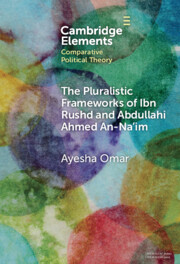Element contents
The Pluralistic Frameworks of Ibn Rushd and Abdullahi Ahmed An-Na'im
Published online by Cambridge University Press: 28 January 2025
Summary
Information
- Type
- Element
- Information
- Online ISBN: 9781009386333Publisher: Cambridge University PressPrint publication: 20 February 2025
Bibliography
Accessibility standard: Unknown
Why this information is here
This section outlines the accessibility features of this content - including support for screen readers, full keyboard navigation and high-contrast display options. This may not be relevant for you.Accessibility Information
- 1
- Cited by
